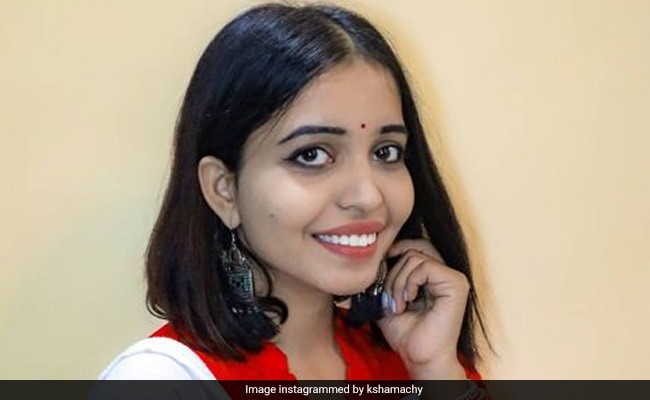
Sologamy comes to India: Funda behind Kshama Bindu's self-marriage act

Tying the bridal knot with oneself, like Vadodara resident Kshama Bindu plans to do later this month, is not really an ‘act of narcissism’. Instead, the bride-to-be Bindu calls marrying oneself or sologamy, which seems to have been around for decades in countries like Japan, Australia and the UK, an “act of self-acceptance”.
Self-marriage is a pledge to be there for oneself and to unconditionally love yourself. To be able to accept who you are and your limitations. It seems to tie in with the well-being mantra of ‘love yourself first, before you start loving another’. In fact, scoffing at the accusation that she is getting married to herself for publicity sake and as a gimmick, Bindu, a working professional defends herself: “What I am trying to portray is that women matter.’ Moreover, Bindu ostensibly does not need the publicity since she is already popular on social media as an influencer.
But, she is clearly the first in India to take the saat pheras on her own and apply sindoor to her forehead all by herself.
Interestingly, in a marriage-obsessed India, Bindu is saying that she is entering into a self-marriage to “break stereotypes” and inspire other people tired of not finding true love, their soulmate (a much-misused word) and getting divorced multiple times. That she is showing an alternative way or rather mocking the system that says you have to be married at a certain age or else you will be skulking on the periphery of society.
In effect, it takes a jibe at the claim that women are failures if they haven’t married by a certain expiry date.
Moreover, Bindu is a bisexual, who had loved a woman and a man in the past but decided she is better off giving all the love to herself now. Commenting on sologamy, psychologists say that the public proclaimation of self-love is also a way for a woman to get over a failed love affair or heartbreak. Their self-esteem is at its lowest at that point and they need to start falling in love with themselves.
Also read: Chef, cheerleader, caregiver: A robot for your every need
Also, Bindu cocked-a-snook at the fairy tale concept of a ‘Prince Charming’, (many girls have turned grey waiting for that particular prince) saying she did not require one and decided to marry herself on June 11. For her marriage, she is to dress up as a bride and take part in rituals that her friends and parents will attend. After the ceremony, she returns to her own home instead of going off with the groom. Like an Italian personal trainer who had a lavish self-marriage wedding in 2017 commented, ‘You can have a fairytale even without the prince.’
In this new-age narrative these women like Bindu are trying to write, it seems, there’s no place for a groom and a greedy family demanding dowry.
The sologamy script
So, what is sologamy? It is the act of marrying oneself in a public ceremony. But, while such a marriage has no legal sanction in India or anywhere in the world, it is more a symbolic ceremony. It is an act to assert one’s self-love and some may see it also as an expression of independence.
According to news reports, this trend can be traced back to Linda Baker, a dental hygienist from the US, who married herself in 1993. This is supposedly the first publicised act of self-marriage. In her marriage ceremony, where Baker said ‘I do’, and to stand by herself in sickness and in health until the day she’s not there, was attended by 75 of her friends.
These weddings have largely been a female-centred celebration, and reports state that many more women would love to marry to themselves, but they’re just self-conscious about it.
But, there are many critics who oppose sologamy. Some call it narcissistic and others criticise it as a pointless submission to a patriarchal institution. Psychologists caution that while this may be a way to heal themselves from a broken romantic relationship, it’s important to make sure their other relationships are healthy.
It’s an unhealthy and lonely place to be if you rely too much on yourself and constantly put your own needs above everything else.
Also read: ‘Sleeping on it’ helps you better manage your emotions and mental health; here’s why
Sologamy services
Sologamy cases have been reported in Japan Italy, Australia and the UK earlier. Since the trend picked up, service providers too have come up in the different corners of the world to help clients marry themselves.
‘Marry Yourself’ in Canada offers consulting and wedding photography, while IMarriedMe.com in San Francisco offers sologamy ceremony kits, including wedding band and vows. In Kyoto, Cerca Travel offers a two-day self-wedding package. There’s New York-based performance artist Gabrielle Penabaz’s company – dedicated to helping people plan their solo events. She claims to have “married” more than 1,500 people, typically in ceremonies like her own, (she also married herself) with mock-up chapels, costumes, cakes and most importantly, vows.
Sologamy in movies
Sologamy has popped up in episodes of popular US TV shows such as Glee and Sex and the City. In a 2003 episode of Sex and the City, Carrie Bradshaw married herself popularising this act as nothing had done earlier. In the 2016 Ben Stiller movie Zoolander 2, the transgender model All (portrayed by Benedict Cumberbatch) is married to herself.


